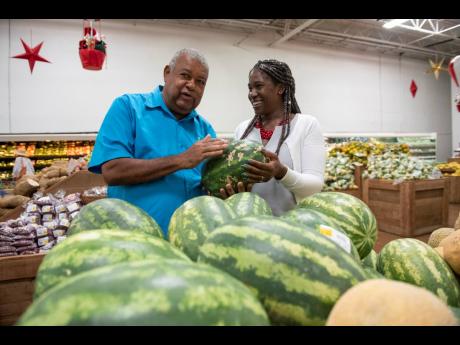Thieves plunder farmers as SOEs, ZOSOs handcuff cops – Fulton
The deployment of hundreds of police personnel under a plethora of states of emergency has hamstrung investigations into praedial larceny, sapping faith in the ability of the security forces to put the brakes on the $5-billion hit to agriculture, a senior farming expert has asserted.
The decentralisation of enforcement from the Praedial Larceny Unit to individual police stations may also have handcuffed law enforcers who have come under pressure to rein in murders and shootings.
States of emergency (SOEs) have been imposed in almost half the country – St James, Hanover, Westmoreland, St Catherine, Clarendon, as well as the St Andrew South Police Division. Mount Salem in St James and Denham Town, Kingston, have been designated as zones of special operations (ZOSOs).
“I think we are getting worse, because one must understand, when you have ZOSO and the state of emergency – and those are important to fighting crime nationally, I’m not criticising them at all – you have a finite amount of policemen and women,” said JAS President Lenworth Fulton, who was speaking with The Gleaner yesterday at the launch of the 16th anniversary of the ‘Eat Jamaican’ campaign celebrations held at MegaMart’s Waterloo Road, St Andrew, facility.
“So if you divert most of them into these programmes, it means that those who are at the station can’t respond as they should, so they really have to expand the police force – maybe it’s a budgetary constraint.”
The Jamaica Constabulary Force and the Jamaica Defence Force do not disclose deployment numbers, citing security concerns.
Fulton further indicated, however, that even before the imposition of the security crackdown, the police failed to implement effective measures to tackle the problem, seemingly prioritising violent crime.
“From our standpoint as farmers, police see praedial larceny as a lowly ranked crime, not on the same level as rape or murder or wounding or shopbreaking. They don’t see it like that – if they see it as a crime at all. So they are not going to put it on the top of their list early in the morning when they get a call. ... I think it is something the commissioner needs to tackle,” he said.
But Sergeant Bruce Williams, acting praedial larceny prevention coordinator, disagrees with Fulton’s sentiments.
“While I can concur that the JCF, like all other government institutions, might not have all the resources desired, I must assure Mr Fulton and the farming community that there are adequate officers to treat with praedial larceny challenges,” he said.
“With effect January 1, 2019, all police divisions were tasked to establish units to treat with praedial larceny-related offences following the decentralisation of enforcement activities at the MICAF-based Praedial Larceny Prevention Coordination Unit. As a result, there has been ongoing resensitisation at the divisional levels of the police on the subject.”
MICAF is the Ministry of Industry, Commerce, Agriculture and Fisheries.
Just this week, a man was arrested in Manchester for allegedly stealing 14 goats and three cows.
Up to September 30, there were 53 recorded cases of praedial larceny, compared to 80 in 2018 and 2017 in 114. However, those numbers suggest that farm theft is heavily under-reported, a trend that aligns with Fulton’s views that small and large agricultural interests have little faith in the capacity of the police. Those statistics also pale in comparison to the industry estimate of $5 billion in annual losses.
But while praedial larceny is among the greatest problems faced by local farmers, they, too, are victims of extortion, as criminals see them as easy targets.
“We lose dozens of farmers every year. Every month you lose them, where people go there, they know they sell the animal or their crops, people come and buy it. So on their farm, they probably have $20,000, $50,000, $30,000 in their pocket and they [criminals] go to their farms and kill some of them. A lot of them have been killed over the year, and it’s troubling.
“Because our business is not immediately bankrolled where you can say to somebody, go and lodge the money and carry the slip. Selling our products is negotiation and arbitrage between a middleman and the farmer … . So it’s on-the-spot negotiation, so money exchange on the spot … and that is something that attracts criminals,” the JAS boss said.

